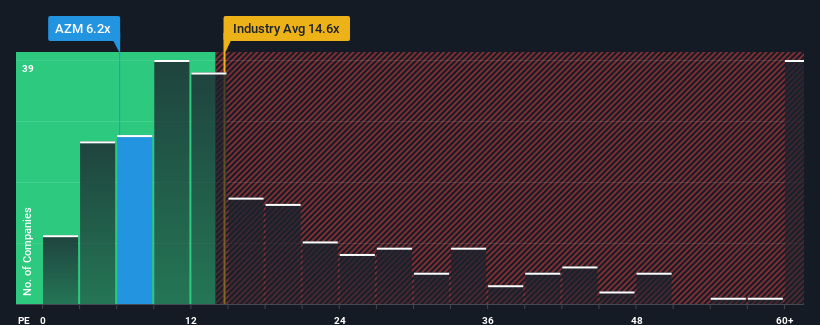- Italy
- /
- Capital Markets
- /
- BIT:AZM
Azimut Holding S.p.A.'s (BIT:AZM) Earnings Are Not Doing Enough For Some Investors

With a price-to-earnings (or "P/E") ratio of 6.2x Azimut Holding S.p.A. (BIT:AZM) may be sending very bullish signals at the moment, given that almost half of all companies in Italy have P/E ratios greater than 15x and even P/E's higher than 26x are not unusual. Although, it's not wise to just take the P/E at face value as there may be an explanation why it's so limited.
With earnings growth that's superior to most other companies of late, Azimut Holding has been doing relatively well. It might be that many expect the strong earnings performance to degrade substantially, which has repressed the P/E. If not, then existing shareholders have reason to be quite optimistic about the future direction of the share price.
Check out our latest analysis for Azimut Holding

Does Growth Match The Low P/E?
Azimut Holding's P/E ratio would be typical for a company that's expected to deliver very poor growth or even falling earnings, and importantly, perform much worse than the market.
If we review the last year of earnings growth, the company posted a terrific increase of 32%. As a result, it also grew EPS by 12% in total over the last three years. Therefore, it's fair to say the earnings growth recently has been respectable for the company.
Shifting to the future, estimates from the six analysts covering the company suggest earnings growth is heading into negative territory, declining 2.5% per year over the next three years. Meanwhile, the broader market is forecast to expand by 20% per year, which paints a poor picture.
In light of this, it's understandable that Azimut Holding's P/E would sit below the majority of other companies. However, shrinking earnings are unlikely to lead to a stable P/E over the longer term. Even just maintaining these prices could be difficult to achieve as the weak outlook is weighing down the shares.
The Bottom Line On Azimut Holding's P/E
We'd say the price-to-earnings ratio's power isn't primarily as a valuation instrument but rather to gauge current investor sentiment and future expectations.
As we suspected, our examination of Azimut Holding's analyst forecasts revealed that its outlook for shrinking earnings is contributing to its low P/E. Right now shareholders are accepting the low P/E as they concede future earnings probably won't provide any pleasant surprises. It's hard to see the share price rising strongly in the near future under these circumstances.
It is also worth noting that we have found 3 warning signs for Azimut Holding (1 shouldn't be ignored!) that you need to take into consideration.
If P/E ratios interest you, you may wish to see this free collection of other companies with strong earnings growth and low P/E ratios.
New: Manage All Your Stock Portfolios in One Place
We've created the ultimate portfolio companion for stock investors, and it's free.
• Connect an unlimited number of Portfolios and see your total in one currency
• Be alerted to new Warning Signs or Risks via email or mobile
• Track the Fair Value of your stocks
Have feedback on this article? Concerned about the content? Get in touch with us directly. Alternatively, email editorial-team (at) simplywallst.com.
This article by Simply Wall St is general in nature. We provide commentary based on historical data and analyst forecasts only using an unbiased methodology and our articles are not intended to be financial advice. It does not constitute a recommendation to buy or sell any stock, and does not take account of your objectives, or your financial situation. We aim to bring you long-term focused analysis driven by fundamental data. Note that our analysis may not factor in the latest price-sensitive company announcements or qualitative material. Simply Wall St has no position in any stocks mentioned.
About BIT:AZM
Excellent balance sheet, good value and pays a dividend.
Similar Companies
Market Insights
Community Narratives




